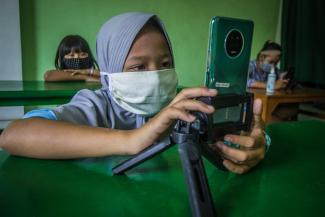Digitalisierung
Do not expect too much of digitised education

International donors are working at top speed to implement digital solutions in the global south, especially in the education sector. They are reallocating large sums to fund digital projects. This is a major shift in international development policy, accelerated by Covid-19. However, especially in the education sector, it is crucial to question the quality and usefulness of these digitalisation measures.
An all too familiar pattern in international development may become evident again. Good intentions do not automatically deliver good results. Many factors must be carefully considered when designing high-quality digital programmes for teaching purposes, and this complex process takes time. For example, merely procuring hardware does not suffice where places lack adequate power supply. According to UNESCO, moreover, only about half the world’s population has a stable internet connection.
Often, students learning at home do not have neither the computers nor the environment they need to attend online classes. Teachers rarely get adequate training. They also lack competent technical support. All too often, they do not even have appropriate software themselves.
It takes years to develop good software. Learning materials should not simply replicate analogue approaches on a screen. Instead, they should exploit the real educational potential of digital tools. Digitalisation of schools also requires effective technical support, which must be equally accessible to every school regardless of its location. The technical support staff must not only be able to deal with hardware and software problems competently but they must also be available to students and teachers. The logistical challenges are huge. Proper digitalisation also requires delivering service seamlessly nationwide. Without this feature, the trendy word “digitalisation” will prove an empty promise, and high expectations will not be met. On the contrary, uneven implementation of digitalisation can compound inequality and worsen learning conditions. That is the opposite of the desired outcome.
The challenges for digitised education in the global south are so wide-ranging that they cannot be addressed by technology alone. Unless teachers can live on their salaries and classes are not cancelled for various reasons regularly, good education will prove illusive. The foundations must be laid first.
The merits of digitalisation as such are not self-evident, and digitalised education must not be implemented in a short-sighted way. It is only a means to an end. The goals are multifaceted. Solutions must be tailored to specific contexts.
Of course, people long for good news in the Covid-19 pandemic, and yes, this crisis may indeed offer opportunities. Wishful thinking, however, does not help in a sector that requires endurance and sustainability. Digitalisation can only become an educational blessing where the foundations for effective learning have been laid. Donors must not engage in a race to fund programmes that merely emphasise quantitative targets such as the number of computers delivered. The quality of education is what really matters.
Julia Maria Fesser studies Public Policy at the Hertie School in Berlin and Sciences Po in Paris. Previously she worked at the GIZ Liaison Office to the African Union in Addis Ababa.
julia@jfesser.de












